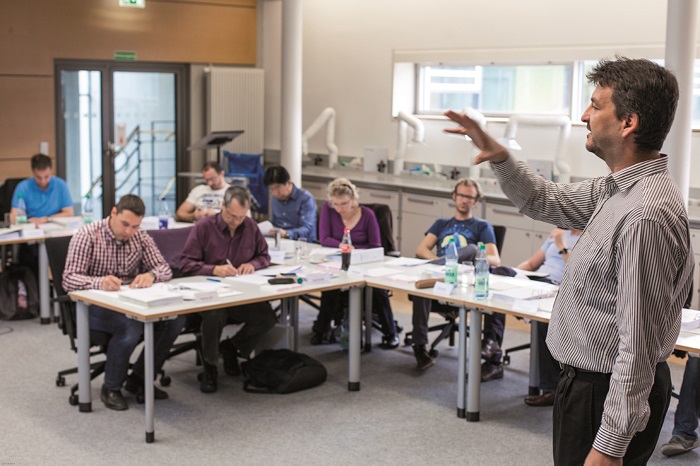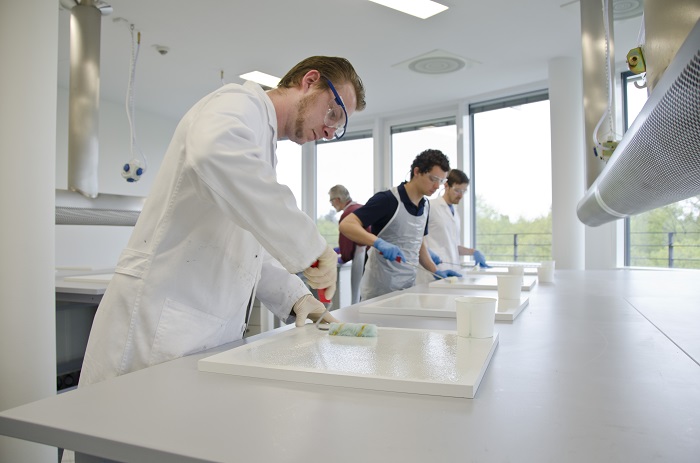

The Fraunhofer IFAM is considered an expert in the field of manufacturing technology and applied materials research. As a knowledge mediator, it has been offering a wide range of courses in the field of further education for 25 years. It started with adhesive bonding technology and for some years now it has also been offering courses in the field of fiber composite technology. Stefan Simon is a research associate and lecturer at the Fraunhofer IFAM's Fiber Composites Training Center. In an interview, he explains to us which offers are available in this field and why participants always experience an aha moment in the course.
From the very beginning, the principle "One course - one further training" was important for the further training courses at Fraunhofer IFAM. For each target group (workers, master craftsmen, engineers) in the company or enterprise there is the appropriate further training - so each participant can acquire new knowledge appropriate to the work context and expand his or her previous portfolio. The following list shows the current courses offered by the Fiber Composites Training Center:
- FRP manufacturer: enables participants to produce high quality FRP components in manual processes
- FVK remanufacturer: enables participants to estimate the fundamental effects of individual components such as fibre type and matrix of the composite material on the finished components and to carry out repairs professionally
- FVK specialist: enables participants to prepare work instructions and to implement them professionally in maintenance and operational production in the respective context
- Composite Engineer: enables participants to design and responsibly manage the entire product lifecycle of a component made of fibre-reinforced materials, from product development and manufacturing to repair and recycling. The Composite Engineer will also be available in English from November 2019, which means that all courses in the field of fibre-reinforced composites will be available in English.
Mr. Simon, how are the individual courses related? Do they complement each other, build on each other or even overlap?
The courses are structured in such a way that the higher the level of the participants, the deeper they get into the theoretical knowledge. In the one-week courses for the worker level, the FVK remanufacturer and FVK manufacturer, the main focus is on the skills required to be able to carry out work instructions correctly and to get a feel for different materials. Here there is a relatively high practical part of 50-70% - important is the handling of the material, which is then completed with theoretical knowledge. In the course of the FVK specialist, the participants should get to know different manufacturing processes as well as their application and behaviour when using the composite materials. There are also theoretical and practical parts. The most comprehensive technical overview is provided by the Composite Engineer course. It qualifies the participants to supervise the entire process that a composite component goes through - from development and production to repair and recycling. Particular emphasis is placed on interlocking, which is reflected in the flexible selection and composition of the modular course units.
How does a classical further education at the Fraunhofer IFAM work?
I can explain this using the example of the FVK specialist. Here, the course takes place in three individual weeks, with an interval of about two to three weeks between courses. The reason for this is that a company can seldom spare its employees for three weeks in a row. Distributed individual weeks with some distance between them are much better justifiable here. The knowledge is then usually explained in the morning in a theoretical part. In the afternoon there is the opportunity to apply and test the knowledge in practice. This is not the case with the English language courses: since the participants often have a very long journey to attend, three separate course weeks are out of the question. Here, the three weeks take place in one go and end directly with the final examination.
What do the participants learn that they did not know before?
Let's stay with the example of the FVK specialist: Many participants in this further training course come from the field of metallic materials and possibly expect them to behave in a similar way to fibre composites. These participants often experience an aha-moment: Due to the fact that fibre composites are mostly not a homogeneous and isotropic material, but consist of a fibre and matrix component, they behave very differently in production and processing. With a fibre composite material, for example, I cannot compensate for a dent by hitting it with a hammer as I can with a sheet of metal, I have to think a little more complex here. This means that I have to understand the structure of the material and, above all, that a fibre composite component is characterised by directionally different properties. But this complexity is also an advantage: you have many more possibilities for individual design. However, if you don't know how the design guidelines work with fibre composites and how the material behaves, a component is quickly produced that has lower mechanical characteristics than the one being substituted.
Of course, not all of our participants come from the field of metallic materials. Some come from quality assurance or already have experience in the field of fibre-reinforced composites. Here, knowledge can also be gained, for example, by getting to know new processes.
Can I also take the courses if I come from the field of adhesive bonding technology?
Many of our participants in adhesive bonding technology courses are increasingly dealing with FRP components. Therefore, we have already included a small theoretical part on the subject of FRP in our further training courses for European Adhesive Specialists and European Adhesive Engineer. In industry, different materials are increasingly being combined with each other in the so-called multi-material construction method and often joined by bonding. Fibre-reinforced composites play an important role here. Since they behave differently than metallic components, it is important to further educate oneself in this field. Because bonding technology and fibre composites are becoming more and more intertwined, our further training courses are certainly also useful for people who come from the field of bonding technology.
To what extent do the participants benefit from attending further training at the Fraunhofer IFAM?
A big advantage that the Fraunhofer IFAM has to offer is of course the aspect that we are directly involved in research. This means that our participants always learn about the latest state of the art and we can always provide small insights into completely new techniques that represent the spearhead of development and are not (yet) industrial standard. We see ourselves as a link between research and industry. To this end, we also involve experts from various fields, so that we can provide a complete overview of various topics such as starting materials, manufacturing processes and repairs, rather than just covering a single area. In addition, our participants receive an "all-round carefree package", so to speak: from registration and an online preliminary course to detailed accompanying documents for the course, to a hotel in the immediate vicinity and the final certificate from the relevant personal certification body, as well as a certificate of participation from the Fraunhofer IFAM.
Many thanks for the interview!